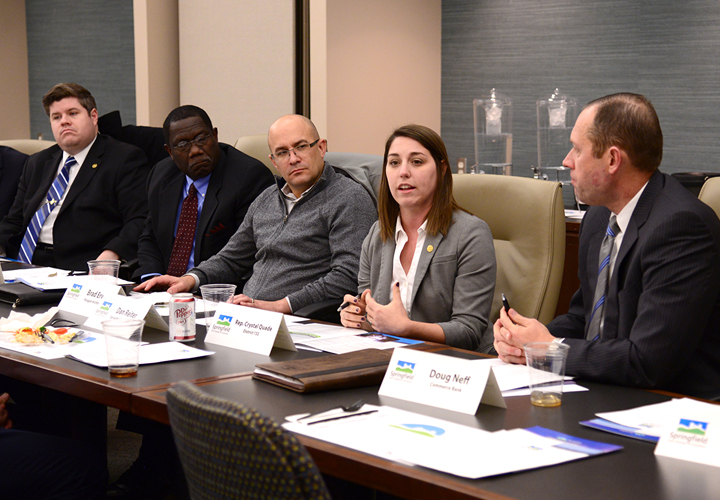Discussing Chamber priorities with the local legislative delegation

January 11 was, in the words of Chamber Board Chairman Jeff Childs, a "signature opportunity" for a conversation between state legislators and leaders of the Springfield business community.
That was the day of the Chamber's annual legislative luncheon, when members of the local legislative delegation visit the Chamber office to hear from Chamber volunteer leaders about our priorities for the new year and offer their own thoughts on those issues as well.
The consensus among those at the table was that while 2018 was a tremendously successful year in terms of accomplishing our goals, there is still much to be done.
At the top of the list were issues related to workforce development. Legislators were urged to follow up on the 2018 reauthorization of the Missouri Works Customized Training Program by restoring funding for the program, which has declined significantly in recent years.
Also on the workforce front is OTC's planned Center for Advanced Manufacturing. Voters approved a tax levy increase in April 2018 for the program, but state funding for the program – and for OTC as well as Missouri State University, as a whole – is vital as well.
Outgoing Chamber board member John Gentry, who also serves on the OTC Board of Trustees, said both local institutions are very successful despite being the lowest-funded in the state on a per-student basis.
"Why? Because one thing we do is listen to our community and local businesses and figure out what their needs are, and then we serve those needs," he said. "OTC's curriculum is built primarily to serve our community's needs." And, Gentry indicated Missouri State operates in the same way – being responsive to local employer needs to equip the workforce.
And the Chamber encouraged legislators to look at ways to make the A+ program available to adults, which would allow them to better retool their skills to meet changing workplace demands and attract high-paying jobs to the area.
"We need to find ways for adults to access those skill-up programs," said Chamber Board Treasurer Marshall Kinne of Med-Pay, Inc. "It's not just about attracting jobs; it's about attracting high-paying jobs that let people earn a living wage."
One item that was unsuccessful in 2018 was funding for transportation, though legislators did pass a bill that allowed voters to consider a tax increase to fund road improvements. The failure of that ballot issue leaves legislators in a particularly tough spot this year.
"With our central location in the nation, we should be leveraging that to our advantage, but years of inaction have made it one of our biggest liabilities," said Mary Beth Hartman of Hunter Chase & Associates. "Our road system is vital to ensuring prosperity of our economy. It's time we move past just identifying the need and have the courage to do something."
With all of these priorities jockeying for state funding, budgeting is harder than ever – which is why the Chamber's priority list also includes a pause on tax cuts.
"Missouri is always in fierce competition, for jobs and for workforce," said Past Board Chairman Doug Neff of Commerce Bank. "We know our low tax rates already make us very competitive for businesses; site selectors have told us they are much more concerned now about things like workforce, roads, and education. So we encourage you to take a pause on broad-based tax cuts. We need the money for investment in the future of our state."
That was welcome news to Rep. Crystal Quade (D-Springfield), who had served on the state budget committee for the last two years and now serves as the House Minority Leader. She said she was encouraged to hear support for a pause on tax cutting, as the budget is already stretched thin.
Overall, Rep. Lynn Morris (R-Nixa) said he was thankful to have the opportunity to meet with the business community leaders and for their advice – and he's optimistic about the upcoming session.
"These priorities that you've laid out are not red or blue items; they're issues to help the 6.2 million people of Missouri," Morris said. "I hope we can take on the issues that can help everyone and get these things done for the whole state."

